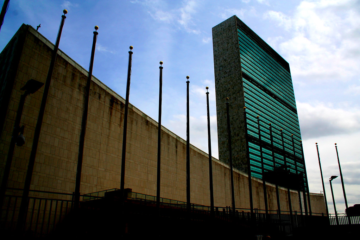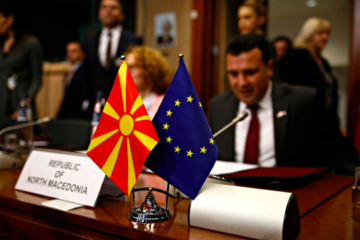Historically, Russo-German relations have been argued to be “a series of alienations, distinguished for their bitterness, and of rapprochements, remarkable for their warmth”, from shared experiences as international pariahs in the 1920s to the total destruction of the Second World War. While such cyclical patterns are an exaggeration, particularly recent historical events continue to shape contemporary encounters between the countries on the diplomatic stage. Germany maintains a unique relationship with Russia, neither fully an ex-Soviet state or fully a Western power. Research indicates that only one-third of East Germans think Russia is a country which is foreign to them, in comparison to more than half of Western Germans. It is also primarily East German politicians, like Thuringian Governor Bodo Ramelow or Saxony-Anhalt Governor Reiner Haseloff who criticise “gunboat diplomacy” in favour of dialogue. Geographic and historical divides along the face of the Berlin Wall remain, as the former DDR retains a different memory and relationship to Russia.
This shared past alone complicates German-Russian relations, in addition to political divisions. Opinions blur party lines, generating unconventional alignments. The CDU, Greens and a consortium of SPD members like Foreign Minister Heiko Maas and Vice Chancellor Olaf Scholz form one bloc, united through their humanitarian concerns and prioritising ideas of containment. Opposing this are the more Russophile sentiments of the CSU, AfD and the Left Party united by admiration of Putin’s Russia as well as Ostpolitik Social Democrats like Gabriel and Steinmeier. Doubtlessly, the role of personalities has also shaped relations. Both Merkel and Putin’s experiences in the DDR have led to them developing broader experiences of their respective partners. Theoretically, this should improve relations, and in the past, it has certainly encouraged dialogue. Merely on a superficial level, Merkel is the only current Western leader to converse in Russian. Nevertheless, differences of opinion remain at the centre of German politics on the Russia question.
The result of these divisions is primarily a confusion of policy, between economic cooperation and the threat of further sanctions. Germany was at the forefront of Ukrainian sanctions in 2014, but the reality is hardly as clear cut. Only a day after expelling four Russian diplomats in solidarity with the UK over the Skripal poisoning, German authorities gave the green light for building the €9.5 billion Nord Stream 2 pipeline. This double game helps to defuse tensions between Kremlin critics and Russia-friendly forces at home, but also creates a broader ambivalence in EU foreign policy. If, and how long economic and political interests can be separated in foreign policy remains to be seen. Germany has placed itself between the strongly pro-Russian rhetoric of the Italian and Austrian government, and more critical Baltic states. Particularly as appeals for cohesion in EU foreign policy continue, a decisive shift to either conversation or confrontation with Russia could fundamentally change the global alignment of power.
Importantly, the issue of Russian relations is not merely one of dialogue over deterrence, but also symbolic of Germany’s broader foreign policy. Traditionally seen as a staunch advocate of US foreign policy, cracks have appeared in Germany’s “Westbindung”; its traditional political alignment with the West. The fundamental clash of politics between Merkel and Trump has certainly not helped, but Germany has also grown increasingly critical of US foreign policy in general. As stated by Sigmar Gabriel in 2017: “aggressively combining foreign policy issues with American economic interests…is definitely not something we can accept”. What’s more, only recently Annegret Kramp-Karrenbauer, who has been tipped to succeed Merkel as a Chancellor, criticised a letter by US Ambassador Richard Grenell threatening companies involved with the Nord Stream 2 project with sanctions. Among NATO members, only France and Turkey held more official talks with Russia than Germany in 2018. Significantly, this number must be seen in the context of Germany’s government formation talks, Macron’s notably active diplomacy and Erdogan’s increasingly independent strategy in Turkey. With the US no longer seen as the reliable ally it was in the past, Berlin may choose to develop its own strategic interests with Moscow.

Undoubtedly, there are issues of contention to be addressed, and the circumstances of Russia’s current relations with the West require prudence. Although there have been allegations of Russian strategic interference in German elections, these have not occurred on any similar magnitude to the US. Nevertheless, significant divergences on issues including human rights and the treatment of dissidents, disarmament, and the Ukraine crisis undermine a comprehensive deepening of ties. Indeed, it seems naïve to think economics is wholly separated from political issues. While differences of opinion are hardly exceptional in global politics, clearly a broader understanding of political points of contention needs to accompany any strengthening of relations.
Ultimately, the opportunities from Germany’s relationship with Russia should, however, not be underestimated. When asked which states their own country should work more closely with, 81% of Germans mention Russia– as opposed to only 59% for the US. Berlin has been intimately involved in attempts to solve violence in Eastern Ukraine through the Minsk Protocol and Minsk II. While other countries have focussed more on containment and sanctions, the continuing existence of methods of communication like the “Petersburg Dialogue” promoting German-Russian understanding will be vital in escaping the current East-West spirals of escalation and accusation. German foreign policy must maintain the delicate balance of subordinating political concerns to business interests, reducing its normative power in favour of realist strategy, whilst being aware that economic and political power also gives it leverage to discuss other issues.
Germany’s relationship with Russia is more than merely a question of deterrence over dialogue, as relations must be viewed in a historical context of the DDR and Ostpolitik. Given the success of the politics of rapprochement then, it would be sensible to ask: why not now? Germany’s unique geographical and political connections place it at the centre of Russia’s relations with the international stage; neither fully aligned with the West nor an intimate ally with Russia. If it is true, as has been argued, that the Russo-German relationship is an overall barometer of conflict and cooperation in Europe, then the nature of their future interactions lies at the crux of visions for the West. A German politics of normalised relations could immensely help to ameliorate the current tensions between the Russia and the West.


